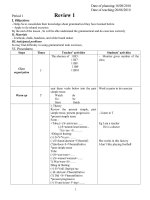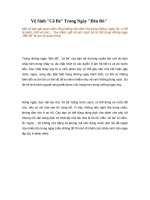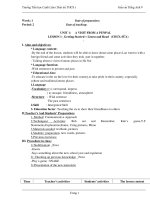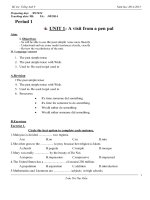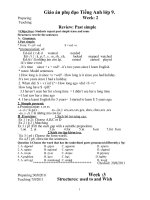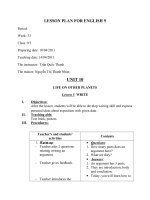Giao an tuan 1 Tieng Anh 9 he 10 nam
Bạn đang xem bản rút gọn của tài liệu. Xem và tải ngay bản đầy đủ của tài liệu tại đây (673.4 KB, 6 trang )
<span class='text_page_counter'>(1)</span>Week 01 ENGLISH 9 Period 01 REVISION + TEXTBOOK INTRODUCTION Date of preparation: 15/8/2016 Date of teaching: 22/8/2016 A. Objectives: 1. Knowledge: - Help students revise some points of grammar with because, although, if, when, while, 2. Skills: Develop students’ listening, speaking and reading skills. 3. Attitude: Educate students to have the good attitude to English subject. 4. Competences: Develop the competences of communication, cooperation, using languages, and problem solving. B. Preparation: - Materials: Students’ books, teacher’s book, laptop, speaker and projector. - Method: T- WC, individual work, pair work and group work. C. Procedures: I. Organization: 9A: Date ……………… - Absentee................................................................................................................... 9B: Date ……………… - Absentee.................................................................................................. Teacher’s activities Students’ activities II. Warming up and revision (25’) Five groups write the words related to those topics. Brainstorming (ppt) Group 1: Leisure activities Teacher and other students give comments Group 2: Life in the countryside. Group 3: Peoples of Viet Nam Group 4: Our customs and tradiotions Group 5: Festivals in Viet Nam Group 6: Folk tales Group 7: Pollution Group 8: English speaking countries Group 9: Natural disasters Group 10: Communication Group 11: Science and technology Group 12: Life on other planets 1. What is your hobby? Why do you take this hobby? 2. List 5 advantages of living in the countryside. 3. How many peoples are there in Viet Nam? Which is the most? 4. Tell one of your family traditions? 5. Name at least 5 festvals in VN and in the world you know. 6. Name at least 5 folk tales you you. 7. What are types of pollution? 8. Name at least 5 English speaking countries and their capitals. 9. What are types of natural disasters? Which one often happens in VN and which one never happens in VN? 10. How did people use to communicate in the past? And now? 11. List the benefits from science and technology. 12. Write 9 planets of solar system?. III. New lesson (15’) 1. Text book Introduction 1. How many units are there in this text book? 2. What is the tittle of unit 1? 2? 3? 4? 5? 6? (Show the book map) 3. Where can you know the contents of one unit?.
<span class='text_page_counter'>(2)</span> 4. What structures do you find in one unit? 5. What is the first period? 6. What do you learn and practise in A closer look 1? 7. What skills are practised in Skills 1? 8. What skills are practised in Skills 2? 9. Does the teacher talk more or less than students in the Looking back and Project? 10. What part in one unit do you like? Why? 11. What part do you think the most difficult? Why? 12. What part do you think the most interesting? Why? 13. Where can you find the meanings of new words? 14. Is the pronunciation part important? Students will do the task individually and give answers in front of the class. Teacher and other students will give comments 2. Guide to learn and use the text book - What do you focus in Getting started? Students answer the questions - What are you interested in A closer look 1? - Answer individually - What do you learn in A closer look 2? - What do you do in Communication? - What skills do you practise in Skills 1? - What skills do you practise in Skills 2? - What should you do for a better Project? IV. Consolidation (3') ? Reanswer all the questions above. Listen and copy main ideas. V. Homework ( 2') - Revise the words related to the topics in - Listen and take notes the assignments. English 8. - Prepare Unit 1 – Local Environment - Getting started ................................................................................................................................................................ ................................................................................................................................................................ Week 1 UNIT 1. LOCAL ENVIRONMENT Period 2 Lesson 1. Getting started:A visit to a traditional craft village Date of preparation: 15/8/2016 Date of teaching: 24/8/2016 A. Objectives: 1. Knowledge: By the end of the lesson, students will be able to: - Listen and read for specific information about Nick's, Phuc's and Mi's visit to Bat Trang traditional craft village. - Practice reading and doing some exercises with the lexical items related to traditional craft village. - Be presented about the topic for their project. 2. Skills: Listening, speaking, reading, writing 3. Attitude: Educate students to have the good attitude to traditional craft village. 4. Competences: Develop the competences of communication, cooperation, using languages, and problem solving. B. Preparation: - Materials: Students’ books, teacher’s book, laptop, speaker and projector. - Method: T- WC, individual work, pair work and group work. C. Procedures: I. Organization: 9A: Date ……………… - Absentee................................................................................................................... 9B: Date ……………… - Absentee...................................................................................................
<span class='text_page_counter'>(3)</span> Teacher’s activities II. Warm up: (5’) Matching - Teacher shows all the pictures in 2 p7. - Tells Ss that in the box are some traditional handicrafts of different regions in Vietnam. - Gets feedback and lead in the lesson.. III. New lesson: Listen and read (15') 1. New words - Teacher uses different techniques to teach vocabulary (situation, realia) - Follows the seven steps of teaching vocabulary * Checking vocab: R.O.R 2. Getting started * Set the scenes: T. asks Ss: ? Look at the picture on page 6 ? Who and what can you see in the picture? ? Where are they? ? What do you know about Bat Trang? - We are going to listen and read a dialogue about Nick, Phuc and Mi's visit to Bat Trang. - Play the recording twice. a. Find a word or phrase - T. controls the class to do the tasks. - Gets feedback. - Helps Ss study the Watch out box. As far as I know"is an expression. It is used to " say that you think you know something but you cannot be completely sure, especially because you do not know all the facts. b. Answer the questions - Asks Ss to read the questions to make sure they understand them. - Asks Ss to check their answers by reading the dialogue again. - Ask for Ss' answers, and corrects. Students’ activities Activity 1. Matching ? Look at the pictures. ? Work in groups and match these handicrafts with the pictures. ? giving your answers to class Keys: A. paintings B. drums C. marble sculptures D. pottery E. silk F. lacquerware G. conical hats H. lanterns Activity 2. New words + Ss listen → repeat→ say the meaning → copy.. - Individual - take over - artisan - memorable. (v): (n): (adj):. tiếp quản thợ làm nghề thủ công đáng nhớ. Activity 3 - Answer the questions individually. * Suggested answers - Nick, Phong and Mi - a lot of pieces of pottery - in Bat Trang traditional craft village Activity 4 Listen and read a. Find a word or phrase ? Listen and read then do 1a P7 ? Work independently to find the words with the given meanings in the dialogue. ? Read out the lines in the dialogue that contain the words. ? Share the answers - Quickly write the correct answers on the board. Keys: 1. craft 2. set up 3. take over 4. artisans 5. attraction 6. specific region 7. remind 8. look round b. Answer the questions ? Answer the questions without reading the dialogue again. - Ss exchange their answers with a classmate.. Keys: 1. They are at Phong's grandparents' workshop in Bat Trang. 2. It is about 700 years old. 3. His great-grandparents did. 4. Because people can buy things for their house and make pottery themselves there. 5. It's in Hue. 6. Because the handicrafts remind them of a specific region. Practice (20') Activity 5. Practice 1. Complete the sentences ( 3 P7) 1. Complete the sentences (3 P7) - The complete sentences will give Ss Ss complete the sentences with the words/phrases in 2. information about the places where the Key.
<span class='text_page_counter'>(4)</span> handicrafts are made. - Call on two Ss to write their answers on the board. Confirm the correct answers. - If time allows, T may organise a short activity to check Ss' short-term memory. - Have Ss close their books. Point at each of Ss' answers on the board and quickly Ss have to call out the place where this handicraft is made. 2. Quiz (4 P7) a: Work in pairs to do the quiz - Elicit feedback from other pairs. Confirm the correct answers. b : Work in groups (If time allows). 1. conical hat (nón lá) 2. lanterns (đèn lồng) 3. silk 4. paintings 5. Pottery 6. marble sculptures (nghệ thuật khắc đá) 2. Quiz (4 P7) ? Work in pairs to do the quiz. - The pair which has the answers the fastest is invited to read out their answers. 1. park 2. museum 3. zoo 4. beach 5. beauty spot ? Ss work in groups to write a similar quiz about places of interest.. IV. Consolidation (3') ? Recall some information about Bat Trang Activity 6. Further Practice traditional craft village. Answer T’s questions ? Are there any craft villages in your neighbourhood? ? What products do the artisans make? V. Homework (2') ? Learn by heart all the new words. - Listen and take notes the assignments. ? Do Ex B1,2 , 3, 4P4 (Workbook) ? Prepare: Closer Look 1 ................................................................................................................................................................ ................................................................................................................................................................ Week 1 UNIT 1. LOCAL ENVIRONMENT Period 2 Lesson 2: A Closer Look 1 Date of preparation: 15/8/2016 Date of teaching: 25/8/2016 A. Objectives: 1. Knowledge: By the end of the lesson, students will be able to: - use the lexical items related to traditional crafts and places of interest in an area. - say sentences with correct stress on content words. - prepare for their project. - improve about: + Grammar: present simple, verb form + Vocabulary: traditional crafts 2. Skills: Listening, speaking, reading, writing 4. Competences: - Co-operation: work in pairs, groups - Self- study: work individually. - Creativeness: talk about traditional crafts - Using language to do exercises B. Preparation: - Materials: Students’ books, teacher’s book, laptop, speaker and projector. - Method: T- WC, individual work, pair work and group work. C. Procedures: I. Organization: 9A: Date ……………… - Absentee................................................................................................................... 9B: Date ……………… - Absentee................................................................................................................... Teacher’s activities Students’ activities II- Warm up (5'): Asks Ss to call out some traditional crafts they - Listen to the teacher remember from the previous lesson. Tell them that in.
<span class='text_page_counter'>(5)</span> this lesson they are going to learn some verbs that are used to talk about producing or creating a craft. These will help them use the language correctly when they talk about the making of traditional crafts in a specific region. III. New lesson Vocabulary (15') 1.1. Presentation - Elicit the answers from Ss and quickly write them on the board. - Do not confirm the correct answers at this stage. - Correct Ss' explanations when needed. The two verbs cast and mould are quiet difficult, so make that Ss understand them: - cast: shape hot liquid metal, etc. by pouring it into a container. - mould: shape a soft substance into a particular form or object by pressing it or by putting it into mould. 2. Practice a. The purpose of this exercise is to help Ss understand more deeply and use the verbs correctly to talk about producing and creating crafts. b. This activity will help Ss to manipulate the verbs as they are not all regular. - Elicit feedback from other Ss. Confirm the correct answers.. . - Work in groups - Write on the board.. - Ss work individual to do this exercise and then compare their answers with a classmate. - Ss explain the meaning of each verb in English or Vietnamese.. - Ss look at their answers on the board and say if these are correct. Cast Embroider Mouldu. (v): (v): (v):. Đúc Th Đổ khuôn, tạo khuôn. Weave (v): Đan (rổ, rá), dệt Knit (v): đan (len) Key: A. cast B. carve C.embroider D.weave E.mould F. weave G.knit Repeat in chorus and individually - Copy all the words. - Ss work in pair to do the exercise. Check the answers as a class. If time allows, Ss can make sentences. Key: 1.b 2.d 3.e 4.a 5.f 6.c - Ss do the activity, then two Ss write their answers on the board. Key: 2. cast; cast 3.wove; woven 4.embroidered; embroidered 5. knitted; knitted 6. moulded; moulded c. Organise a competition for this activity. Set a time - Ss works in groups of five or six to write limit of five minutes. If time allows, T may ask ss to down as many places of interest in the word explain why they think the places are entertaining, web as possible. The group with the most cultural, educational or historical. places is the winner. The winning group presents their words. Others tick the similar words they have and add more if they can. Suggested answer: - Entertaining: cinema, department store, restaurant, café, theater, opera house, club…. - Cultural: opera house, museum, craft village, historical building, theater, market…. - Educational: library, museum, theater…. - Historical: building, temple, shopping district, market, beauty spot…. d. Complete the passage - Do the task individually Asks Ss to do the exercise individually. Check their Key: answer as a class and confirm the correct ones 1. historical 2. attraction 3. exercise 4. traditional 5. Culture 6.handicraft 2. Pronunciation (15'') 2.1. Present the stress on content words in sentences - Tells Ss that they are going to learn about sentence - Listen to the teacher.
<span class='text_page_counter'>(6)</span> stress. - Explains that in spoken English, we use sentence stress to show our listeners which parts of our sentences are the most important. These are the parts that carry the most meaning. 2.2. Practice - Elicit answers from Ss. Do not confirm the correct - Ss read the five sentences and underline the answers. words they think are stressed. - Asks Ss to read the four questions and make sure - Ss discuss their answers to the four questions they understand them. in pairs. - Asks Ss to listen to the speaker reading the Audio script: sentences and at the same time check whether their 1. The craft village lies on the river answers are correct. Tell them that this is actually the bank. first question and other questions can be answered 2. This painting is embroidered. after listening. 3. What is this region famous for? - Calls some Ss to give the answers and give 4. Drums aren’t made in my village. feedback. Plays the recording again for Ss to repeat 5. A famous artisan carved this table the sentences. beautifully. - Has Ss read the information in the box to remember 1. the content of the lesson. Key: 4. Sentence 1: the, on, the 2. Sentence 1: craft, village, lies, river, bank Sentence 2: this, is Sentence 2: painting, embroidered Sentence 3: is , this, for Sentence 3: what, region, famous Sentence 4: in, my Sentence 4: drums, aren’t , made, village Sentence 5: a, this Sentence 5: famous, artisan, carved, table, beautifully They are: articles, prepositions, pronouns, and 3. They are : nouns, verbs, adjectives, adverbs, wh- possessive adjectives. question words, and negative auxiliaries. - Play the recording for Ss to check their answers - Ss do this exercise individually and compare and practice reading the sentences. their answers with a classmate. - Call some Ss to give the answers and read the Audio script and Key: sentences. Give correction if needed. 1. The Art Museum is a popular place of interest in my city. 2. This cinema attracts lots of youngsters. 3. The artisans mould clay to make traditional pots. 4. Where do you like going at weekends? 5. We shouldn’t destroy historical buildings. IV. Consolidation (2') - Retell the whole lesson - Answer teacher's questions. V. Homework (2') ? Learn by heart all the new words. - Listen and take notes the assignments. ? Do Ex A1, 2, B1, 2 (workbook) ? Prepare: Unit 1: Closer Look 2 Improvement: ................................................................................................................................................................ ................................................................................................................................................................. ......................... 2016 Vice Principal’s Approval.
<span class='text_page_counter'>(7)</span>
